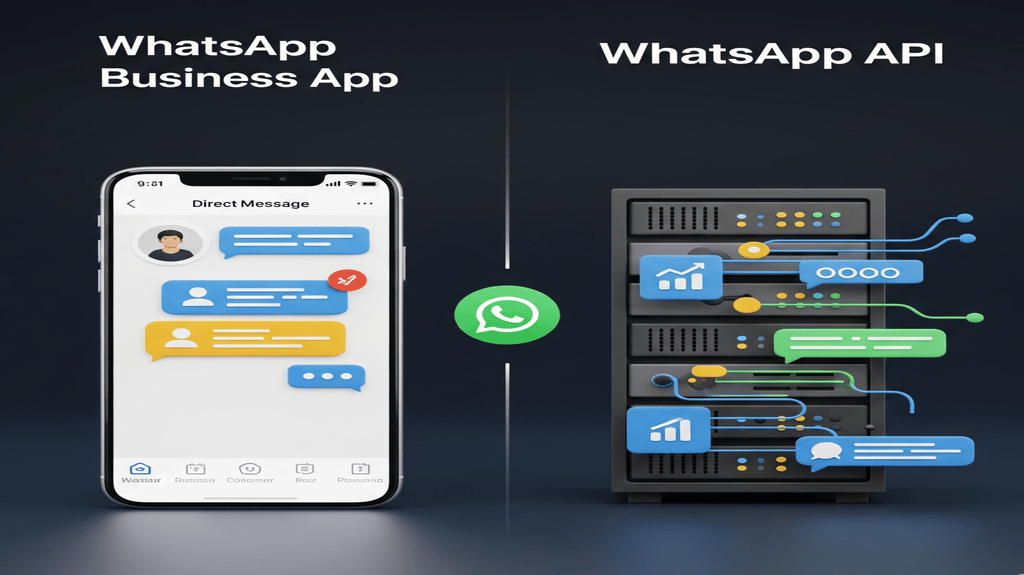If you’re thinking about using WhatsApp to connect with customers, you’ve likely come across two options: the WhatsApp Business App and the WhatsApp Business API. At first glance, they might seem similar. But once you dig deeper, you’ll see they serve different needs.
In this blog, we’ll break down how these two tools compare — in features, setup, cost, and who they’re best suited for. Whether you’re a small shop or a large enterprise, this guide will help you make the right choice.
What Is WhatsApp Business App?
The WhatsApp Business App is designed for small businesses. It’s free, easy to set up, and can be downloaded from the Play Store or App Store. It runs on a single device, just like regular WhatsApp.
Key Features:
- Business profile with hours, address, and website
- Quick replies and labels
- Catalogs to showcase products
- Automated greeting and away messages
It’s great for small teams or solo entrepreneurs who manage a few chats per day.
What Is WhatsApp Business API?
The WhatsApp Business API is built for medium to large businesses. It doesn’t come with a user interface like the app. Instead, it connects to your CRM, chatbot, or helpdesk software through a Business Solution Provider (BSP) like Twilio or 360dialog.
Core Features:
- Multiple users can manage one number
- Chatbots and automation for 24/7 replies
- API integration with other business tools
- Message templates for alerts and follow-ups
It’s a scalable solution for high message volumes, customer support, and marketing.
Key Differences at a Glance
| Feature | WhatsApp Business App | WhatsApp Business API |
| Ideal For | Small businesses | Medium to large businesses |
| Setup | Simple, mobile-based | Needs approval and setup via BSP |
| Users | Single device/user | Multiple agents |
| Automation | Basic auto-replies | Full automation & chatbots |
| Integration | Not available | Fully integratable |
| Pricing | Free | Paid (varies by BSP) |
When to Choose the WhatsApp Business App
You should consider the app if:
- You’re a freelancer, local store owner, or run a small business
- You only need one person handling customer chats
- Your message volume is low
- You want something quick and free to set up
It’s perfect for managing a few chats a day while maintaining a professional presence.
When to Choose the WhatsApp Business API
The whatsapp api for business is a better fit if:
- You run a support or sales team
- You need multiple agents to handle chats
- You want 24/7 customer service using bots
- You need to integrate with your CRM or helpdesk
- You’re planning marketing campaigns via messaging
For growing businesses and enterprises, this option offers flexibility and control.
Real-Life Use Case: From App to API
Let’s say you own a local bakery. At first, the WhatsApp Business App works well. You chat with a few customers a day, send menus, and take orders.
But as you grow, order volume increases. Customers want quick replies. You hire staff, but the app can’t support multiple users. That’s when switching to the WhatsApp Business API makes sense.
With a chatbot for FAQs and support agents sharing a single number, you serve more customers efficiently — and sales go up.
Why the WhatsApp Business API Matters More Than Ever in 2025
In today’s digital-first world, customers expect instant responses and personalized experiences. Traditional support channels like email or phone calls are slowly losing their edge. That’s where the WhatsApp Business API proves invaluable.
Unlike standard communication tools, WhatsApp is already deeply integrated into daily life for billions of people. When you meet customers where they already are, the friction disappears. Customers don’t need to download a new app, sign up for a service, or wait endlessly for replies.
For businesses, this means:
- Reduced response time: With automation and multi-agent access, inquiries are addressed quickly, improving satisfaction.
- Boosted sales conversions: Quick, interactive replies via WhatsApp can help close deals faster than back-and-forth emails.
- Improved brand trust: A verified business profile and structured message templates make your outreach look more professional and legitimate.
If your business is preparing for growth in 2025, investing in scalable and smart communication is essential. The WhatsApp Business API isn’t just another tool — it’s a strategy to future-proof your customer engagement.
How to Switch from App to API
- Choose a BSP – Start with providers like Twilio or 360dialog.
- Get a New Number – It can’t be tied to the app version.
- Create a Verified Facebook Business Account
- Submit for Approval
- Set Up the API – Connect to your CRM, chatbot, or platform.
- Train Your Team – Make sure agents are ready.
Need more help? Read How to Get Started with WhatsApp Business API.
Final Thoughts: What’s Right for You?
Selecting between the WhatsApp Business App and the API comes down to understanding your business’s stage and communication goals.If you’re a solo entrepreneur or running a small business, the WhatsApp Business App offers a simple, no-cost way to manage customer chats. It’s easy to set up and handles basic interactions well.
However, if your business is growing and you’re juggling multiple customer conversations, integrating with support systems, or running marketing campaigns, then the WhatsApp Business API is your go-to option. It provides the scalability and automation needed for smooth, professional communication.Each solution has its strengths. The app is ideal for simplicity and speed, while the API is all about advanced features and long-term growth.



